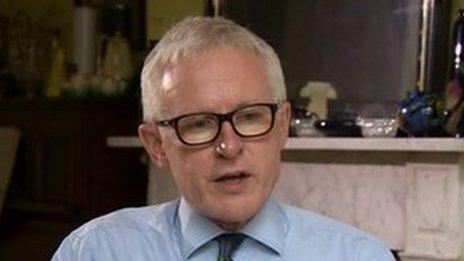NHS plans 'kitemark' for health apps
- Published

Smartphones could become more important in managing healthcare
An NHS "kitemark" for health-related smartphone apps is one of a number of new technological initiatives being backed by NHS chiefs in England.
The NHS has previously said it wants to be "paperless" by 2018 and give patients access to health records via laptops or mobile phones
These new detailed plans also include an e-version of the red book that records baby's immunisations.
But there are concerns about the timescale of plans - and data security.
With the rapid growth of health-related apps for mobile phones and other personal devices, an NHS "kitemark" is to be introduced to validate those deemed to be safe for patients to use.
This authentication process would give doctors peace of mind to recommend apps to help patients manage health conditions.
The idea of putting a child's early years health records - currently they are set out in a "red book" given to all parents - online from 2016 is to guard against the loss of immunisation details which can currently go missing if the actual book is lost.
Behind schedule
Tim Kelsey of NHS England said: "New mothers will now be able to carry their red book around with them on their smart phone and tablet as the NHS moves towards offering digital personal child health records.
"This will put an end to worrying about leaving your child's information at home when going for a review, vaccination, or emergency treatment."
The document also fleshes out a commitment to give patients online access to all care records by 2017. From 2018 these records will be available electronically across the health system, as long as the patient's consent is given.
Despite recent news that providing GP records to patients online is lagging well behind schedule, the NHS blueprint re-affirms the commitment to achieve universal access in England by the spring of 2015.
Currently only around 4% of records are accessible online but health chiefs still believe that a full service is possible next year.
Concerns about privacy have also been raised.
Phil Booth of the campaigning group medConfidential welcomed commitments to make the data secure but said there were fears about information being passed on to other organisations:
"While making patients' information more accessible for their direct medical care is one thing, making it available under "commercial arrangement" for private profit is something else entirely".
- Published11 November 2014

- Published3 May 2014

- Published22 February 2012
